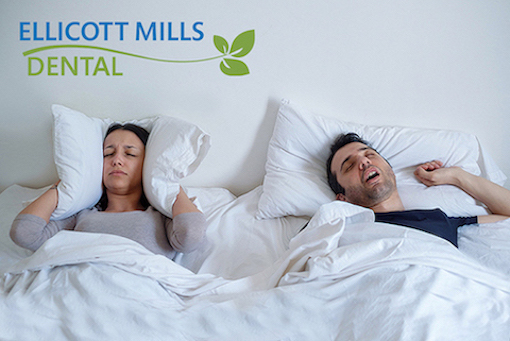Although there are many ways to treat sleep apnea today, not all of them offer the same benefits. In the past, most patients had to choose between CPAP machines, lifestyle changes, and even surgery to address symptoms of this common illness. Now, however, you have the option to work with a qualified dentist who can create a custom oral appliance to improve your sleep apnea. Also, known as oral device therapy, it’s a service we’re proud to offer our patients here at Ellicott Mills Dental. If you’re new to this treatment and would like to learn more, read on! Then, schedule a free consultation with Dr. Becker.
The Basics of Sleep Apnea
In order to better understand how these oral appliances work, you first need to understand sleep apnea. This disease affects more than 22 million Americans, leading to interrupted breathing during sleep. There are several different types of apnea, but all involve repeated pauses when breathing lasting 10 seconds or more.
With obstructive sleep apnea, this is generally caused by blocked airways. Possibly due to poor tongue placement or weak muscles in the back of your throat. Central sleep apnea, however, derives from the brain’s failure to properly control breathing while you’re resting. There’s also complex sleep apnea, which is usually a combination of the other types.
Obstructive sleep apnea is actually the most common, as well as the kind we’re most prepared to treat. With the right approach, you’ll find relief from symptoms including fragmented sleep and low blood oxygen levels. Long-term effects from this illness can be serious. Especially if you experience hypertension, heart disease, and mood/memory issues.
The Standard Treatment: CPAP Machines
When research sleep apnea, you’ve undoubtedly come across CPAP machines. A CPAP, or continuous positive airway pressure, machine has been the go-to treatment for obstructive sleep apnea for years now. It involves wearing an oxygen mask or tube over your nose and mouth as you sleep. The constant pressure forces air through the obstruction, limited your breathing interruptions and related symptoms. Still, some people aren’t able to get a good night’s sleep while wearing this device. It’s bulky, it’s loud, and it requires an electrical connection to work properly. Often times you need to adjust your nighttime routine (and your partner’s) to accommodate your CPAP. Not to mention, it can make traveling more difficult and potentially embarrassing.
Ask about Oral Device Therapy
For mild-to-moderate obstructive sleep apnea, there’s another option. Even though it’s a newer treatment, oral appliances are recommended by the American Academy of Sleep Medicine as successful alternative to CPAP machines. Rather than forcing air through potential obstructions, these oral devices position your jaw forward to maintain open airways. Each one is custom-made for the patient with the help of a licensed dentist. Designed to fit like a sports guard or retainer, it’s small, unobtrusive, and even comfortable—as some would say. You’ll still be able to talk and drink while wearing your oral appliance. Not to mention, sleep comfortably through the night.
If you need help finding a better way to treat sleep apnea, contact Ellicott Mills Dental. Our very own Dr. Becker is an experienced dentist specializing in oral device therapy. Plus, he offers a free consultation to determine if this option is right for you. Give us a call today!


